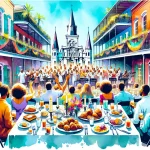New Orleans, affectionately called “The Big Easy,” enchants residents and visitors with its rich history, enthralling culture, and unmatched spirit. From the moment you arrive in this captivating city, you’ll be immersed in a world of colorful architecture, soulful music, and mouthwatering cuisine. Residing in New Orleans is an experience like no other, and this guide will provide you with essential tips and insights to make your transition seamless and enjoyable.
In This Article
TL;DR
- Embrace the city’s unique cultural landscape, festivals, music, and arts scene.
- Find the perfect neighborhood and housing option that suits your lifestyle and budget.
- Navigate transportation options, weather patterns, and safety considerations for a smooth transition.
Cultural Immersion and Community Engagement
New Orleans is a melting pot of cultures, with influences from French, Spanish, African, and Caribbean traditions. The city’s festivals and events are a testament to its diverse heritage, with celebrations like Mardi Gras and Jazz Fest drawing visitors worldwide. To truly embrace the New Orleans way of life, immerse yourself in the local community by attending neighborhood gatherings, supporting local businesses, and participating in cultural activities.
Festivals and Events
Mardi Gras (February/March): The most famous celebration in New Orleans, Mardi Gras is a multi-day festival featuring parades, costumes, and street parties.
New Orleans Jazz & Heritage Festival (April/May): This two-weekend event showcases the best of Louisiana music, food, and crafts.
French Quarter Festival (April): A free festival celebrating the music, food, and culture of the historic French Quarter.
Music and Arts Scene
New Orleans is the birthplace of jazz and a hub for live music. Venues like Preservation Hall (726 St Peter St, New Orleans, LA 70116; open daily 5pm-10pm; tickets $15-$50) and Tipitina’s (501 Napoleon Ave, New Orleans, LA 70115; open for events; ticket prices vary) offer nightly performances by local and international artists. The city also boasts a thriving arts scene, with galleries like the Ogden Museum of Southern Art (925 Camp St, New Orleans, LA 70130; open Thu-Mon 10am-5pm; admission $13.50 adults, $11 seniors, $6.75 children) showcasing the work of regional artists.
Community Involvement
Becoming involved in the local community is a great way to meet people and feel more connected to the city. Consider volunteering with organizations like the New Orleans Area Habitat for Humanity or the Second Harvest Food Bank. Joining neighborhood associations or attending community events like the Crescent City Farmers Market (various locations; open Tue, Thu, Sat 8am-12pm) can also help you integrate into the fabric of the city.
Housing and Neighborhood Guide
New Orleans comprises distinct neighborhoods, each with its own character and charm. When choosing where to live, consider factors like proximity to work, access to public transportation, and the overall vibe of the area.
Choosing the Right Neighborhood
French Quarter: The historic heart of the city, known for its architecture, nightlife, and tourist attractions. Expect higher rents and a lively atmosphere.
Garden District: A picturesque neighborhood featuring grand mansions, tree-lined streets, and a more residential feel.
Marigny: A trendy, bohemian neighborhood known for its colorful houses, live music venues, and proximity to the French Quarter.
Renting vs. Buying
The decision to rent or buy in New Orleans depends on your long-term plans and financial situation. As of 2021, the median rent for a one-bedroom apartment in New Orleans is around $1,200 per month, while the median home price is approximately $325,000. Working with a local real estate agent can help you navigate the housing market and find the best option for your needs.
Utilities and Services
When setting up utilities in New Orleans, you’ll need to contact the following providers:
Electricity: Entergy New Orleans (1-800-368-3749)
Water and Sewage: Sewerage and Water Board of New Orleans (504-529-2837)
Internet and Cable: Cox Communications (1-800-234-3993) or AT&T (1-855-324-0348)
Transportation and Getting Around
New Orleans offers a variety of transportation options, making it easy to navigate the city without a car.
Public Transit
The New Orleans Regional Transit Authority (RTA) operates buses and streetcars throughout the city. The iconic St. Charles Streetcar line runs from the edge of the French Quarter through the Garden District and Uptown, while the Canal Streetcar connects the French Quarter to Mid-City. A single ride fare is $1.25, and day passes are available for $3.
Biking in the City
New Orleans is a bike-friendly city, with dedicated bike lanes on many streets and the Lafitte Greenway connecting Mid-City to the French Quarter. The city also has a bike-share program, Blue Bikes, with stations located throughout the city. Memberships start at $15 per month, with per-ride rates also available.
Driving Tips
If you choose to drive in New Orleans, be prepared for narrow streets, limited parking, and heavy traffic during major events. Many neighborhoods require residential parking permits, which can be obtained through the city’s Parking Division. During Mardi Gras and other large festivals, many streets are closed to vehicle traffic, so plan accordingly.
Weather and Environment
New Orleans has a subtropical climate, with hot, humid summers and mild winters. The average high temperature in July is 91°F (33°C), while the average low in January is 44°F (7°C). The city experiences frequent rainfall, with an average of 64 inches per year.
Understanding Local Weather Patterns
Spring (March-May): Mild temperatures, occasional showers, and the peak of festival season.
Summer (June-August): Hot and humid, with frequent afternoon thunderstorms.
Fall (September-November): Warm temperatures, lower humidity, and the peak of hurricane season.
Winter (December-February): Cool to mild temperatures, with occasional cold fronts.
Preparing for Hurricane Season
Hurricane season in New Orleans runs from June 1 to November 30, with the peak of activity occurring in August and September. To prepare for potential storms, assemble an emergency kit with supplies like water, non-perishable food, flashlights, and batteries. Stay informed about evacuation orders and have a plan in place for where to go if you need to leave the city.
Safety and Emergency Preparedness
While New Orleans is generally a safe city, it’s important to take common-sense precautions and be aware of your surroundings.
Personal Safety Tips
Avoid walking alone at night in unfamiliar areas.
Keep valuables out of sight and be mindful of your belongings in crowded areas.
Use caution when interacting with strangers, especially in the French Quarter.
Emergency Services
In case of an emergency, dial 911 for police, fire, or medical assistance. The New Orleans Police Department (NOPD) has eight district stations throughout the city, and the New Orleans Fire Department (NOFD) operates 33 fire stations. For non-emergency situations, contact the NOPD at (504) 821-2222 or the NOFD at (504) 658-4700.
Education and Schools
New Orleans offers a variety of educational options, from public and private schools to charter and magnet programs.
Overview of Local Schools
The Orleans Parish School Board oversees the city’s public schools, which include both traditional and charter schools. Notable private schools include Isidore Newman School, Metairie Park Country Day School, and Jesuit High School. The New Orleans Center for Creative Arts (NOCCA) is a renowned arts-focused high school that offers programs in music, theater, visual arts, and more.
Higher Education Institutions
Tulane University: A private research university known for its programs in law, business, and public health.
Loyola University New Orleans: A Jesuit university offering programs in arts, sciences, business, and music.
University of New Orleans: A public research university with strengths in engineering, business, and urban planning.
Xavier University of Louisiana: The only historically Black Catholic university in the United States, known for its programs in the sciences and pharmacy.
Healthcare Facilities
New Orleans has a robust healthcare system, with several hospitals and specialized clinics serving the community.
Hospitals and Emergency Care
University Medical Center New Orleans (2000 Canal St, New Orleans, LA 70112; 24/7 emergency care)
Tulane Medical Center (1415 Tulane Ave, New Orleans, LA 70112; 24/7 emergency care)
Ochsner Medical Center (1514 Jefferson Hwy, New Orleans, LA 70121; 24/7 emergency care)
Regular Health Services
Finding a primary care physician, dentist, or specialist in New Orleans is relatively easy, with many practices accepting new patients. The Louisiana Health Care Quality Forum maintains a directory of healthcare providers at www.lhcqf.org.
Local Cuisine and Dining
New Orleans is renowned for its unique culinary heritage, blending French, Spanish, African, and Caribbean influences into a delicious array of dishes.
Iconic New Orleans Dishes
Gumbo: A hearty stew made with meat or seafood, vegetables, and a dark roux, served over rice.
Jambalaya: A rice dish featuring meat, seafood, and vegetables, flavored with spices and herbs.
Po’ Boys: A submarine sandwich on French bread, typically filled with fried seafood or roast beef and dressed with lettuce, tomato, and mayonnaise.
Beignets: Square-shaped doughnuts dusted with powdered sugar, often served with café au lait.
Dining Out
Some must-visit restaurants in New Orleans include:
Dooky Chase’s Restaurant (2301 Orleans Ave, New Orleans, LA 70119; open Tue-Fri 11am-3pm; entrees $12-$25): A Creole institution known for its gumbo and fried chicken.
Galatoire’s (209 Bourbon St, New Orleans, LA 70130; open Tue-Sun 11:30am-10pm; entrees $30-$50): A classic French-Creole restaurant famous for its oysters Rockefeller and trout meunière.
Café du Monde (800 Decatur St, New Orleans, LA 70116; open 24/7; beignets $3 for an order of 3): A landmark café serving beignets and café au lait since 1862.
Mahony’s Po-Boys & Seafood (3454 Magazine St, New Orleans, LA 70115; open Sun-Thu 11am-9pm, Fri-Sat 11am-10pm; phone: 504-899-3374): Known for creative po’boys like the Peacemaker, featuring fried oysters, bacon, and cheddar cheese.
Living in New Orleans is an unforgettable experience, filled with vibrant culture, incredible food, and a strong sense of community. By understanding the city’s unique customs, navigating its neighborhoods, and embracing its spirit, you’ll quickly feel at home in this one-of-a-kind city. Welcome to New Orleans, and laissez les bons temps rouler – let the good times roll!






